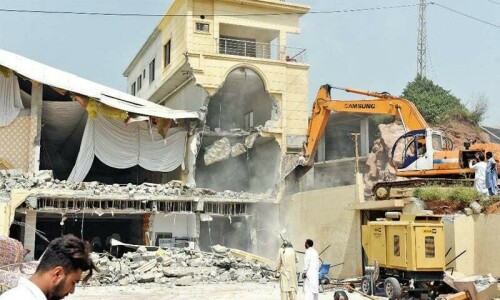KARACHI: Representatives of non-governmental organisations and civil society have strongly opposed the construction of nuclear power plants along the city coast and rejected the arguments being given in favour of the project that, they say, is bound to put lives of over 22 million people at stake.
The specific design of the project (ACP-1000), they said, had been abandoned by China and no such plants existed now in that country or elsewhere in the world. The International Atomic Energy Agency had also not awarded design or safety certifications to the ACP-1000 reactors, they contended.
They were speaking at a press conference organised jointly by the Pakistan Fisherfolk Forum (PFF) and the Pakistan Institute of Labour Education and Research (Piler) at the Karachi Press Club here on Monday.
They questioned as to why Pakistan was being made a guinea pig since a site close to the city had been chosen for the project. World history, they said, had shown that accidents could occur even in the most supposedly safest environments and if that happened in case of Karachi’s yet to be built nuclear plants, the damage to life and property would be huge.
“An unforeseen accident involving radiation exposure could cripple our city and adversely impact the whole country. The assertion of the Pakistan Atomic Energy Commission (PAEC) that there has been no accident in its history is questionable because the organisation doesn’t share any information,” said senior architect Arif Belgaumi.
The government should have learnt a lesson from the Fukushima incident in Japan and explored safer options available for electricity generation, he added.
According to Fahd Ali, an economist teaching at the Habib University, nuclear plants do not provide the cheapest electricity and there is a need to make comparative cost studies.
“With completion scheduled for 2021, the project (K-2/K-3) will not address current electricity shortages for at least six years. Radioactive waste will be released to the atmosphere, land and marine environment and no modelling has been done to prepare for the worst-case scenario,” he argued.
They expressed fears over disposal of spent fuel and pointed out that its storage and decommissioning had not been addressed properly.
“The project will badly affect the lives and livelihood of thousands of fishermen living along the city coast,” said Mustafa Gurgaze of the PFF.
Elaborating his point, he said that a nuclear plant sucked upto 20 million litres of water in a minute to cool the system, leaving a devastating impact on marine life.
“In an immediate reaction, fish and other marine flora and fauna are wiped out. Then, there is a long lasting adverse impact on marine life due to rise in water temperature,” he explained.
The speakers demanded that the government should take input from all relevant departments as well as political parties on this critical project. Besides, all regulations under the IAEA, the United States Nuclear Regulatory Commission and the Pakistan Nuclear Regulatory Authority must be followed in the environmental impact assessment (EIA) report being prepared on court’s orders.
They also cited the Rio Declaration 1994 to which Pakistan was a signatory and called for its compliance.
A clause in the declaration states: “In order to protect the environment, precautionary approach shall be widely applied by states according to their capabilities. Where there are threats of serious or irreversible damage, lack of full scientific certainty shall not be used as a reason for postponing cost-effective measures to prevent environmental degradation.”
The speakers voiced reservations over the eligibility of environmental management consultants tasked with preparing an EIA on the project and said the job should have been given to relevant independent experts.
“The time period for public analysis of the EIA report has been reduced from 30 days (under the Pakistan Environmental Protection Act regulations 2001) to 15 days under the Sindh Environmental Protection Act regulations 2014. While at least 60 days are required to review such a complex project,” said Roland D’Souza of Shehri.
The Pakistan Institute of Labour Education and Research Executive Director Karamat Ali also spoke.
Published in Dawn, February 10th, 2015
On a mobile phone? Get the Dawn Mobile App: Apple Store | Google Play














































